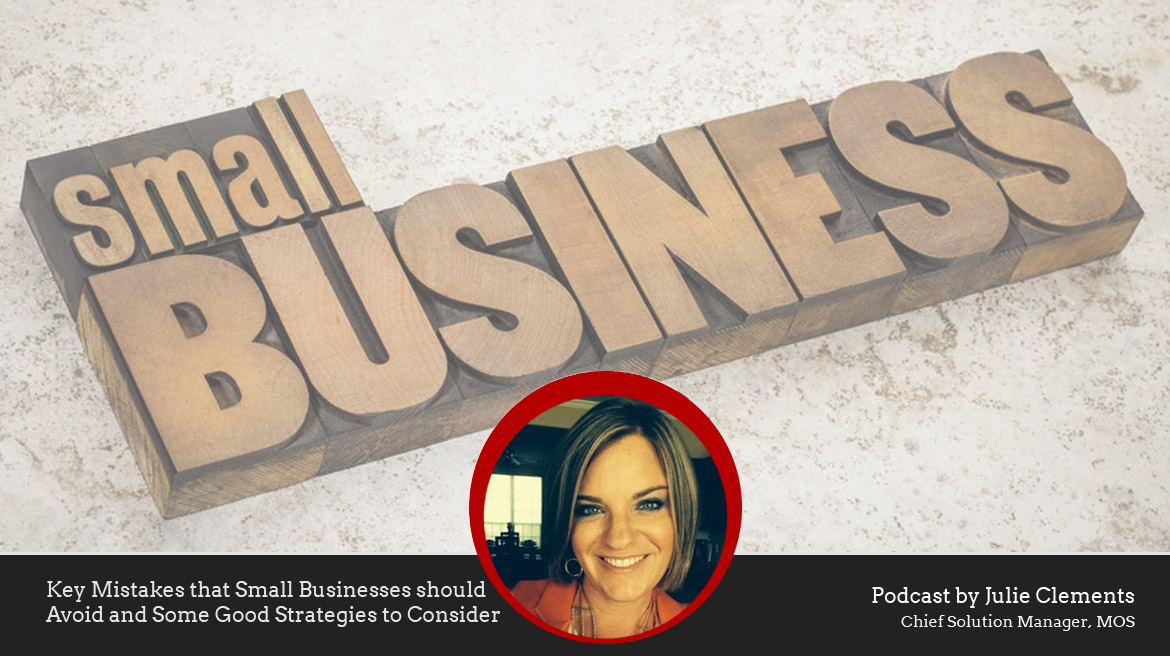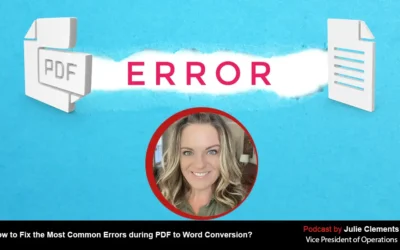Headquartered in Tulsa Oklahoma, Managed Outsource Solutions (MOS) is an experienced hand in providing reliable business process outsourcing solutions to diverse industries – Medical, Legal, Media, and Information Technology.
In today’s podcast, Julie Clements, the Chief Solutions Manager at MOS explains about the key mistakes small business must avoid and certain factors they need to consider for their growth.
The business world has become very, very competitive with technological advances and other innovations that are focused on enhancing productivity, improving response times, monitoring process status, and optimizing workflow. Data entry outsourcing is a practice embraced by most forward-looking businesses now, and it is accepted as a great way of reducing workload and improving efficiency. Proper planning is vital at all stages to run a small business successfully. While there are many strategies for expanding a small business, there are certain practices that could impair the business, which small businesses should necessarily avoid.
Some things to think about are –
Choosing the wrong people: It is a common mistake that most small business owners make. You may go for cheaper options or you may opt for the most experienced candidates. Hiring cheaper employees may sound like a good job but it can prove costly in the long run. Similarly, choosing the most experienced candidates can also be a wrong step to take because they may have an attitude or mindset that is not suitable for your small business team. It is very important to give priority to quality over cost. So, do your proper research and find the right candidates that fit your company. You must screen your prospects very carefully and when you identify the right person, do not think twice about offering the highest compensation you can afford.
Failing to assign tasks to others: Small business owners often fail in assigning tasks appropriately. Delegating jobs could prove difficult in the beginning, but it can be made easier by eliminating tasks that no longer add value to your business. So, delegate your tasks carefully.
Another thing is poor accounting practices. Proper finance is the key to the growth of your business, so it should be handled carefully. Appoint a professional accountant or financial advisor to ensure your accounting activities are running smooth.
Avoiding your risks: Risk takers are winners. Successful businesses are proactive, forward-thinking and are not afraid of any risks. These companies introduce new services, use different strategies and you can experiment with the latest technology. Being in your comfort zone and not taking any risk will only make you stagnate, whereas exposure to risk helps you learn from your mistakes and can propel your growth in the business.
Another thing to think about is your delay in implementation of a process or system: Majority of small businesses start with no proper system or planning. As businesses grow, it is important to have a proper system that all employees follow. Creating guidelines, developing systems and processes, and having a financial and operational plan will help the business to run smoothly.
Now that you know the things to avoid, let’s talk about and consider some effective steps to take that will help grow your small business.
So, here are the top six things I think you need to consider.
First is your competency: Identify what you are good at compared to your competitors and build your business plan around your core competency.
Second thing is your values: Every business holds certain values and ideals. Make sure that you have a commitment towards social and environmental responsibilities and have a great workplace.
Third, your objectives: Have a clear idea about your business goals, how long or how much you want to expand your business, and chart out a realistic plan that must be followed.
Fourth, your product or your service: Identify your best-selling product or service and thereby majority of your customers will associate with your business. This is the anchor of your growth. If your core product or service is facing huge competition, then develop a new core business offering to avoid any negative impact on your business.
The fifth thing, your most profitable areas: Often, your core product or service may not be bringing you the most profit. You may have some other offerings with high profit margins that support the rest of your business. So take these products or services into consideration when planning your business expansion.
And the last thing, the sixth thing is your core market: Identify the kind of customers who you truly rely on. Consider whether you are doing enough to serve these valuable customers, and enhance your offerings to this group. You should also consider whether you are excessively dependent on some customers or distribution channels, and the consequences if something happens with these customers.
Alongside utilizing back office outsourcing solutions to enhance productivity and enjoy cost and time savings, small businesses can consider the above factors to ensure success. Avoid the bad habits that could hurt your bottom line. Any bad habits can be identified via an honest self-evaluation. This will ultimately help in ensuring the betterment of your small business, and increased productivity and profit.
Thanks for listening!
If you want to read further, go to our website at www.managedoutsource.com.
Thank you so much!




